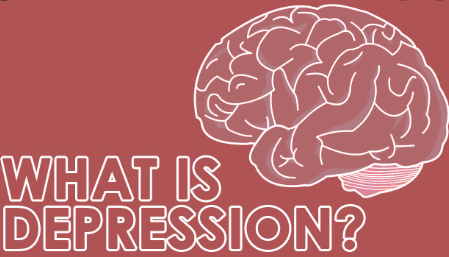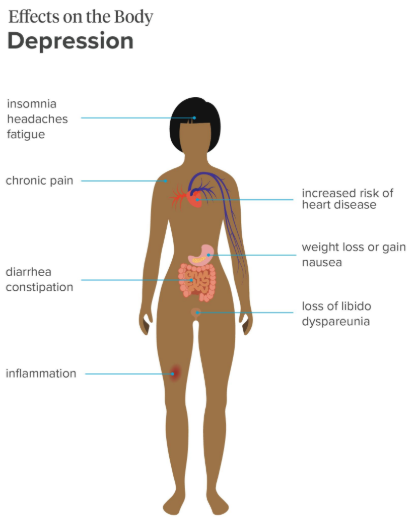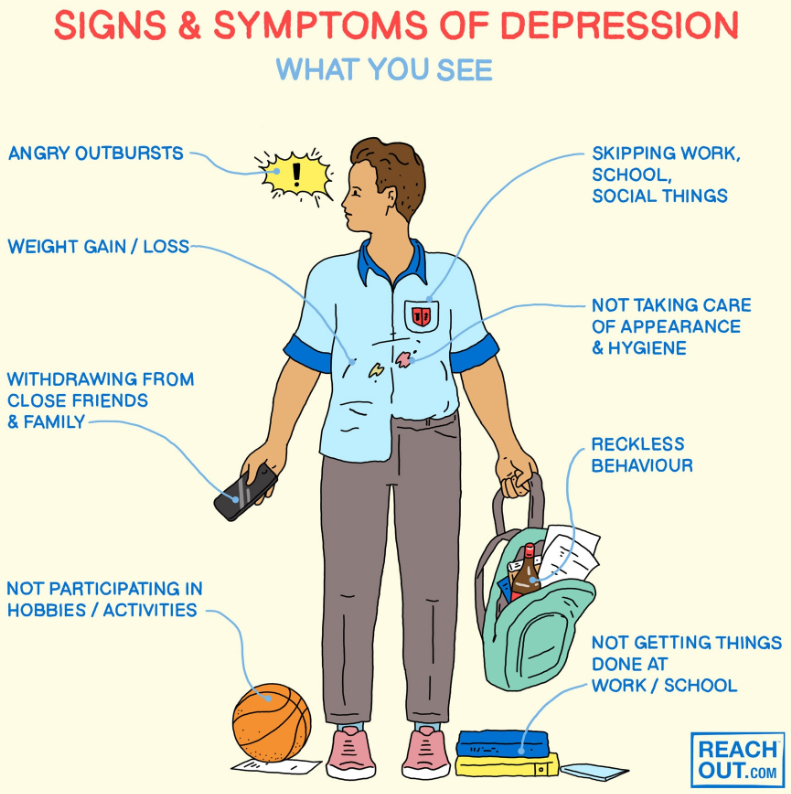Depression is thought to occur in about 1 in 7 people at some stage during their life and is classified as a mood disorder. About 1 in 20 people will have a more severe form of the illness. Generally, several factors play an important role in someone developing depression. Depression is more common after a stressful event such as a breakup of a relationship, a loss of a loved one, employment loss, etc., but it may also occur “out of the blue” in someone who appears to live in ideal circumstances.
Nearly everyone has felt depressed, sad, or down at one time or another. Feeling depressed can be a normal reaction to a stressful event, such as when one suffers a loss or endures another of life’s various struggles or stresses. Sometimes, however, these feelings of depression can become intense, last for long periods (weeks or even months) and prevent a person from doing their normal day to day activities. This is what is known as ‘major’ or clinical depression. It is a serious medical illness that affects how you feel, think, and behave.
Depression has a lot of features, but the most common are a deep feeling
of sadness or a loss of interest or pleasure in activities which you previously
liked doing.
These symptoms must be present for at least a few weeks before clinical
depression can be considered as a possibility.
Things you may notice if you are living with depression
- Continuous low mood or sadness
- Feeling hopeless and helpless
- Having low self-esteem
- Feeling tearful
- Feeling worthless or guilt-ridden
- Feeling irritable and intolerant of others
- Having no motivation or interest in things
- Finding it difficult to make decisions
- Not getting any enjoyment out of life
- Irritable mood
- Feeling anxious or worried
- Having suicidal thoughts or thoughts of harming yourself
The physical symptoms of clinical depression include
- Difficulty concentrating
- Changes in appetite or weight (usually decreased, but sometimes increased)
- Constipation
- Unexplained aches and pains
- Lack of energy
- Low sex drive (loss of libido)
- Changes to your menstrual cycle
- disturbed sleep – difficulty falling asleep, waking up early or sleeping more than usual
The social symptoms of clinical depression include
- not doing well at work
- avoiding contact with friends and taking part in fewer social activities
- neglecting your hobbies and interests
- having difficulties in your home and family life
What causes depression
We know that there are physical changes in the level of certain chemicals in the brains of people who are depressed (these chemicals include serotonin and noradrenaline). There is also evidence that if your close relative has depression, you are at greater risk of developing it too because of a genetic vulnerability.
Other contributory causes of depression can include:
- Alcohol and drug abuse.
- Serious physical and mental illnesses.
- Lack of social support, confiding friendships, etc.
- Lack of good coping skills in dealing with stress or ongoing problems or conflicts.
What can I do to feel better?
There are many things that can be done to help you feel better while working through your depression, however, it is understood that doing these activities can seem difficult to consider due to low mood.
- If your depression is being triggered by stress or pressure, for example in your job, stress management may help.
- Try to get regular exercise and eat a well-balanced diet.
- Try to avoid alcohol and illegal drugs – such substances can worsen depression.
- Make sure you get enough rest and maintain a regular sleep schedule.
- Improve your social outlets, e.g. hobbies, meeting with friends, evening courses etc. This may be difficult during the acute stage of depression, but it is important that you don’t isolate yourself as this will only make depressed feelings worse in the long run.
- Confide in trusted friends or family about how you are feeling – don’t keep things bottled in. Sometimes just talking can help lighten the load a little. Seek professional help early and follow through on any advice that your doctor or therapist gives you.
Other types of depression
There are different types of depression. Some conditions may also include depression as a symptom.
· Postnatal depression
o Some women develop depression after they have a baby. This is postnatal depression. It's treated in a similar way to other types of depression. This includes talking therapies and antidepressant medicines.
· Bipolar Disorder
o Bipolar disorder is also called 'manic depression'. In bipolar disorder there are spells of both depression and high mood (mania). If you have bipolar, you will move between depression and mania.
· Seasonal Affective Disorder
o Seasonal affective disorder (SAD) is also called 'winter depression'. SAD is a type of depression that happens in winter.
Please
see some links below for more information:
Psychiatry.org - What is depression?
For help and support with depression please click HERE



